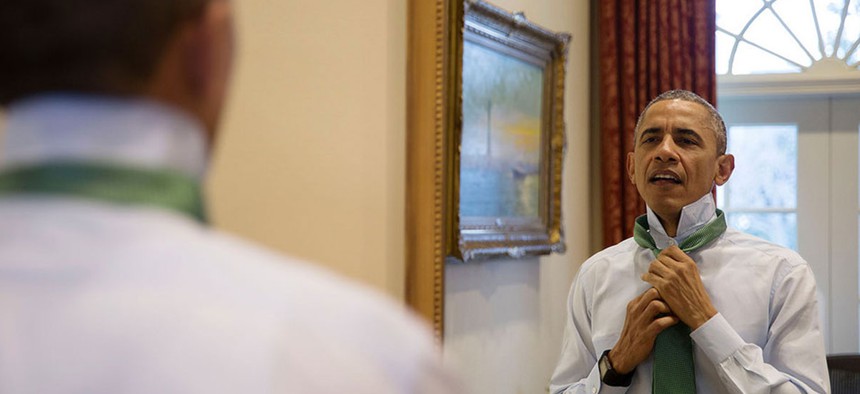
Pete Souza/White House file photo
Obama’s Poignant, Feminist Advice to Dads
“It is absolutely men’s responsibility to fight sexism too.”
Men are taken more seriously than women at work. We’re given better feedback, we’re not penalized for asking for raises, and we aren’t criticized for the way our voices sound. We are rewarded for becoming parents, for being assertive, for having sexualities at all–areas where women face stigma. Even our experience of pain is taken more seriously by doctors.
But the privileges come with a cost: Gender stereotyping means that boys and men are expected to behave in pretty limited ways, all of which exalt a traditional, and arguably toxic, version of masculinity.
Using the word “pussy” as an insult, as Clint Eastwood, that purveyor of all-American manhood, just did this week is a great example. In Esquire, he described the acknowledgement of racism in today’s society as a “pussy generation” that is “walking on egg shells.” Presumably, he meant that being sensitive to suffering and the structures that uphold it are both “feminine” and (relatedly) not worthwhile.
Contrast that with a beautiful op-ed President Obama wrote for Glamour this month, which is a step-by-step guide from one of the most powerful men on earth about how to be a better man. It’s about learning to be a better ally to women via fatherhood. For starters, he owns up to the ways in which he has failed his partner:
I’ve seen how Michelle has balanced the demands of a busy career and raising a family. Like many working mothers, she worried about the expectations and judgments of how she should handle the trade-offs, knowing that few people would question my choices. And the reality was that when our girls were young, I was often away from home serving in the state legislature, while also juggling my teaching responsibilities as a law professor. I can look back now and see that, while I helped out, it was usually on my schedule and on my terms. The burden disproportionately and unfairly fell on Michelle.
More potently, he calls attention to his own journey of breaking out of claustrophobic gender norms:
Growing up without a dad, I spent a lot of time trying to figure out who I was, how the world perceived me, and what kind of man I wanted to be. It’s easy to absorb all kinds of messages from society about masculinity and come to believe that there’s a right way and a wrong way to be a man. But as I got older, I realized that my ideas about being a tough guy or cool guy just weren’t me. They were a manifestation of my youth and insecurity. Life became a lot easier when I simply started being myself.
He calls on all of us to help change sexism on our streets and in our schools, workplaces, and homes by making visible the many invisible biases we carry:
We need to keep changing the attitude that raises our girls to be demure and our boys to be assertive, that criticizes our daughters for speaking out and our sons for shedding a tear. We need to keep changing the attitude that punishes women for their sexuality and rewards men for theirs.
We need to keep changing the attitude that permits the routine harassment of women, whether they’re walking down the street or daring to go online. We need to keep changing the attitude that teaches men to feel threatened by the presence and success of women.
We need to keep changing the attitude that congratulates men for changing a diaper, stigmatizes full-time dads, and penalizes working mothers. We need to keep changing the attitude that values being confident, competitive, and ambitious in the workplace—unless you’re a woman. Then you’re being too bossy, and suddenly the very qualities you thought were necessary for success end up holding you back.
We need to keep changing a culture that shines a particularly unforgiving light on women and girls of color. Michelle has often spoken about this. Even after achieving success in her own right, she still held doubts; she had to worry about whether she looked the right way or was acting the right way—whether she was being too assertive or too “angry.”
Finally, he appeals to parents, and to fathers in particular, to use the word “feminist” and to be allies to the women in their lives:
Michelle and I have raised our daughters to speak up when they see a double standard or feel unfairly judged based on their gender or race—or when they notice that happening to someone else. It’s important for them to see role models out in the world who climb to the highest levels of whatever field they choose. And yes, it’s important that their dad is a feminist, because now that’s what they expect of all men.
It is absolutely men’s responsibility to fight sexism too. And as spouses and partners and boyfriends, we need to work hard and be deliberate about creating truly equal relationships.
This isn’t the first time President Obama has called himself a feminist (“I may be a little grayer than I was eight years ago, he told the firstUnited States Women Summit in June, “but this is what a feminist looks like”). It is, however, rare to hear any man, much less the US president, speak to men explicitly about how making a better world for our partners and daughters and friends starts by first looking at one’s own relationship to masculinity.
Here’s hoping those of us in the “pussy generation” raise sons less concerned with being a “real man” like Clint Eastwood, and more with being a man who is really himself.
NEXT STORY: The Clinton Team's Affable Attack Dog






